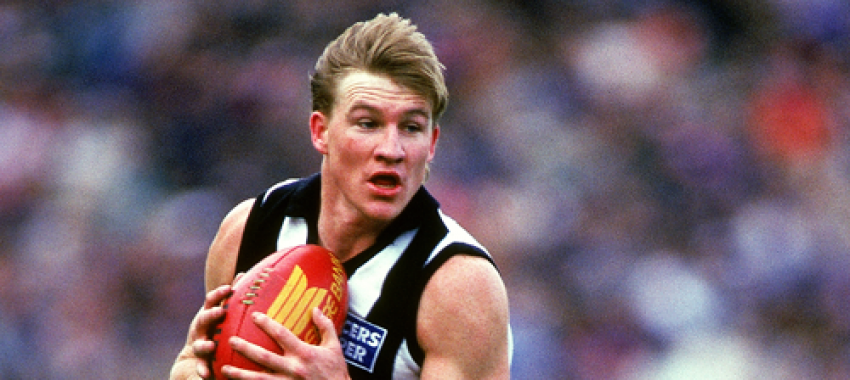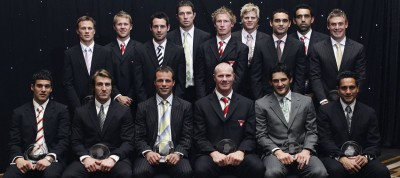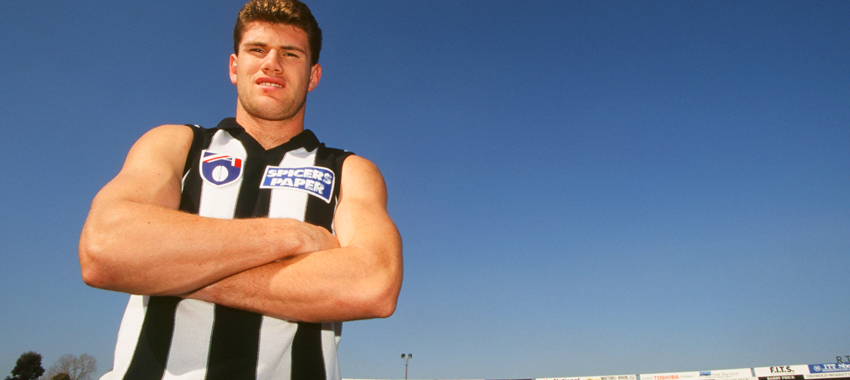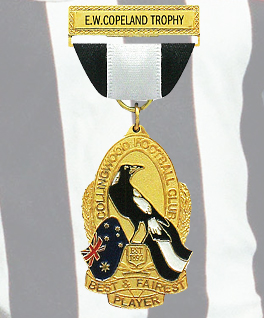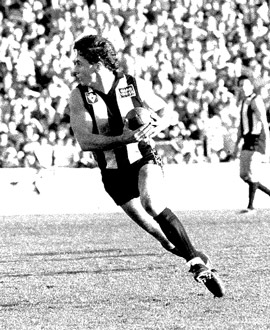
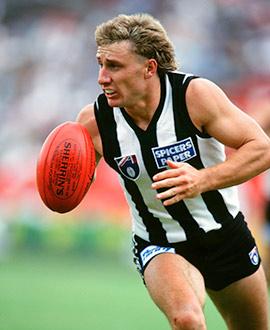
Football critics often talk about how a player or two could be 'the missing piece of the puzzle' in a club's chase for Premiership success. At the end of 2009, for example, everyone knew that Collingwood needed a ruckman, and a hard-bodied in-and-under midfielder. Darren Jolly and Luke Ball appeared in that off-season and - hey presto - a flag followed the very next year.
That sort of instant success rarely happens. Yet almost exactly the same thing had happened for the Magpies 20 years earlier. Then it was widely known we needed more speed, and more run-and-carry. Two South Australians, Tony Francis and Scott Russell, would fill those holes and, like Ball and Jolly in 2010, propel the Magpies to instant Premiership success.
Francis was the classic rover of the pair. Collingwood's recruiting manager Graeme Allan thought he was the best rover outside the VFL, a description that belied his lowly Draft position - taken at pick #95 in the 1988 National Draft. But Allan was so convinced of his initial assessment that he made 13 separate trips to South Australia to see him.
Francis stayed with Norwood for the 1989 season but by 1990 was ready. He came across during the off-season and was ready to go for Round 1 of the 1990 season, against West Coast in Perth on the day of his 21st birthday. But what should have been a day of celebration turned into disaster when he was suspended for six weeks for kicking the Eagles' Murray Rance. It was not the 'instant impact' the Magpies had been hoping for.
But it was just about the only mistake Tony Francis made that year. A few months later he had played a key role in Collingwood's fabled droughtbreaking 1990 Premiership, sharing the Best First Year Player award with Scott Russell. By the end of the following season he was regarded as one of the best rovers in the competition.
It's not hard to see why. He was small but strongly built, fast and fearless in his attack on the ball. He was great in-close and at the bottom of packs, but also damaging when running with the ball. He loved the tough, hard stuff, didn't mind being cheeky and was also handy around goals. In short, he was a classic Collingwood rover.
Legendary Magpie Bob Rose once described him as "the most natural rover [we've had] here for many years". "He has tremendous pace, outstanding courage, he's a beautiful kick and, for a little fellow, as good a tackler as I've seen. I didn't have a rover anywhere near like him.”
But while his courage and fearlessness helped define him, Francis hadn't always played football that way. One of the moments that shaped his football destiny came when his father, Laurie, took him aside as a small, lightly-framed 14-year-old and told him a few home truths.
"I would have been about 14, I was playing school football and with the Norwood underage teams," Francis recounted. "I thought of myself as a reasonably skilled player, but you could say I was an outside player. Dad took me aside and said the one sure way of getting the ball was to go in and get it for yourself. He told me to start doing the maths. He said there are 36 players out there and one ball, and if you are waiting for it to happen, there are 35 others out there who can get it before you can."
The conversation brought about a transformation in Francis' game. His ferocity would become one of his greatest strengths, although his manic attack on the contest would later prove an Achilles heel to his longevity.
In those early days Francis thought of himself as a better cricketer than a footballer. He captained the South Australian under-17s cricket team - Darren Lehmann was his vice-captain - and in another age he might have been able to straddle both sports effectively. But as football pushed towards the professional era, he realised one of them had to go. He chose football after his father pointed out that there were more than 50 players on club playing lists back then, and there were only 12 spots in the South Australian cricket team.
He graduated through Norwood's junior development program. Then across two seasons at the top level in the SANFL, he played 47 games, gaining a reputation as a courageous rover, not dissimilar to John Platten. That aggression at the ball, and in tackling, saw him break his collarbone when he crashed into the 204cm, 104kg frame of Woodville's Romano Negri.
It was the kind of action that Tony Shaw could fall in love with: "The way he hit the ball should act as an example for everyone … I thought I was pretty desperate when I was young, but he's twice as desperate."
He fitted into his new club well, even if his passion for tertiary education had him at odds with some teammates. He would joke with Damian Monkhorst, the man who first nicknamed him ‘Little Man’, about cell cultures and microscopes. His teammate - a plumber - would always come back with, “Tony, do you know what an S-bend is?'”
Francis capped off an eventful first season in black and white by playing in Collingwood's first Premiership in 32 years. He had 24 disposals in the match, and a game-high eight tackles, and teammate James Manson rated him one of the team's two or three most important players that year.
But the sudden death of Francis’ father just prior to the 1991 season rocked him.
"I was just an angry person there for quite some time, to lose your dad for no real reason," he recalled. "He was in Royal Adelaide Hospital and I had just played a trial game. Mum said 'don't worry too much', as Dad said he would be fine. But obviously he wasn't. I went back, but I never got the chance to say goodbye."
Francis said he received strong support from Collingwood, notably Allan and president Allan McAlister, and resolved to dedicate the 1991 season to his father and mentor. He took his game to a higher plain that year, playing 21 games, winning the Copeland Trophy, becoming an All-Australian and fulfilling an ambition to play for South Australia.
He was often tagged in those early years but coach Leigh Matthews said of the attempts to stop him: "People try to tag Tony ... but tagging doesn't affect him. Tony doesn't get easy kicks; Tony only gets the hard ones.”
Leigh also warned Tony that his style of play could limit his longevity. And while Tony admitted that he "actually enjoyed that physical trauma", Matthews' words proved prescient.
Tony suffered Achilles tendon troubles in 1992, with the issue having an impact on one of his greatest assets - his speed. He felt he was never quite the same player with quite the same pace after that. And he battled injuries constantly. One year he ripped a quad muscle and played on in considerable pain, copping some criticism for kicking too often on his left foot. He only did that because he felt his right quad was going to give way each time. By 1995, a combination of thigh and knee injuries limited him to just eight games.
He flirted with the idea of joining Adelaide at the end of 1995, but opted to remain a Magpie. Somehow he was able to turn back his body clock and have a free run at it in 1996, playing 20 matches and finishing fifth in the Copeland Trophy.
But the injury issues soon returned. In the preseason of 1998 he suffered a knee injury that curtailed him until Round 8. He showed some good glimpses, including strong efforts in his last two games in black and white. He was delisted at the end of that year, acknowledging that he didn't quite see eye-to-eye with Shawry as a coach. St Kilda picked him up and he managed a further 19 games in his single season there.
Tony Francis's Collingwood career ended with more of a whimper than a bang. And that's a shame, because the full-on way he played his footy, and the huge impact he had on the Club in his first few years, warranted a much stronger ending.
- Glenn McFarlane
CFC Career Stats
| Season played | Games | Goals | Finals | Win % |
|---|---|---|---|---|
| 1990-1998 | 142 | 103 | 6 | 52.1% |
CFC Season by Season Stats
| Season | GP | GL | B | K | H | T | D | Guernsey No. | ||
|---|---|---|---|---|---|---|---|---|---|---|
Other CFC Games
| Team | League | Years Played | Games | Goals |
|---|---|---|---|---|
| Collingwood | Night/Pre-season | 1990 - 1997 | 7 | 3 |
| Collingwood | Reserves | 1990 - 1998 | 13 | 8 |
Also Played For
| Team | League | Years Played | Games | Goals |
|---|---|---|---|---|
| St Kilda | AFL | 1999 | 19 | 5 |
Awards


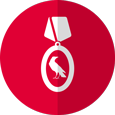
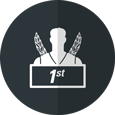
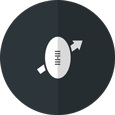

 x2
x2


